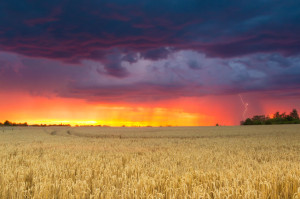 At Spinner Ag, we understand that agriculture is much more than just cultivating crops — it’s an intricate dance with the ever-changing rhythms of nature. One of the most influential partners in this dance is undoubtedly the weather. From minor fluctuations to severe weather events, it’s clear that weather patterns significantly impact agriculture, altering the course of crop growth and yield. This blog post serves to clear the fog on this intricate relationship between weather and agriculture.
At Spinner Ag, we understand that agriculture is much more than just cultivating crops — it’s an intricate dance with the ever-changing rhythms of nature. One of the most influential partners in this dance is undoubtedly the weather. From minor fluctuations to severe weather events, it’s clear that weather patterns significantly impact agriculture, altering the course of crop growth and yield. This blog post serves to clear the fog on this intricate relationship between weather and agriculture.
Planting
To start, weather profoundly affects the entire lifecycle of a crop. It begins with soil preparation. Ideal climatic conditions, optimal rainfall, and temperature are crucial for preparing the fields and sowing the seeds. Too much rain can lead to waterlogging, while too little can dry out the soil, creating unfavorable conditions for germination.
Germination
Next comes the germination stage, the ‘birth’ of a new plant from a seed. Seeds require specific temperature ranges for successful germination. For instance, corn needs temperatures between 50-86°F (10-30°C). If the temperatures swing beyond these bounds, the germination process can become sluggish or even stall completely.
Growth
During the growth phase, plants need an optimal blend of sunlight, temperature, and rainfall to thrive. Sudden shifts in these variables could stunt growth, potentially leading to diminished yields. Droughts, in particular, can have a crippling impact, causing plants to wilt and die due to their inability to extract water from the parched soil.
Harvesting
In the harvesting stage, clear and dry weather is typically desired. Wet weather during harvest can lead to the proliferation of pests and diseases, negatively impacting the quality of the produce and increasing post-harvest losses. Notably, rice and wheat are significantly affected by wet weather during harvesting.
Beyond these distinct stages of cultivation, weather is also a significant factor in the spread of pests and diseases. For instance, wet and humid weather conditions can create a breeding ground for many types of fungi and insects, which could lead to crop diseases and reduced yields.
Understanding Weather Impacts
Extreme weather events, increasingly prevalent in the era of climate change, pose a substantial threat to agriculture. Floods can drown crops and wash away fertile topsoil, while droughts can dehydrate crops and turn fertile land into desert. Heatwaves can cause heat stress, impairing photosynthesis and leading to reduced yields or, in severe cases, total crop failure.
In addition to understanding the impacts of weather on agriculture, it’s equally important to develop strategies to mitigate these impacts. At Spinner Ag, we specialize in high-quality agricultural chemicals and offer a comprehensive range of products from herbicides to fungicides to insecticides. Our expert team has an extensive understanding of the effects of weather on different crop species and can suggest suitable chemical solutions to protect your crops against weather-induced threats.
Furthermore, the role of technology cannot be overstated. Modern tools like weather forecasting, soil sensors, and remote sensing help farmers anticipate, prepare for, and respond to changing weather patterns.
Understanding how weather impacts agriculture, and ensuring we have robust systems in place to respond to these impacts, is not just important — it’s essential for the sustainability and prosperity of our global food system. Remember, as significant as these weather impacts are, they’re not insurmountable. Through knowledge, innovative technology, and the right agrochemicals, we can shield our crops from the vagaries of weather.
At Spinner Ag, we’re committed to helping you navigate through these fluctuations and safeguard your harvest. We’re here to support you with our industry expertise, quality agricultural chemical products, and steadfast reliability. Weather might be unpredictable, but your crop yield doesn’t have to be. Our farm to your future — that’s the Spinner Ag difference.